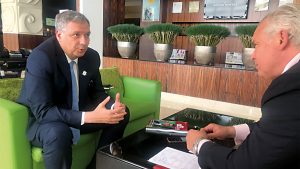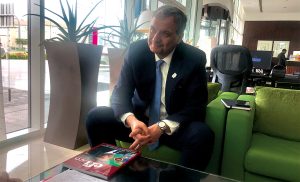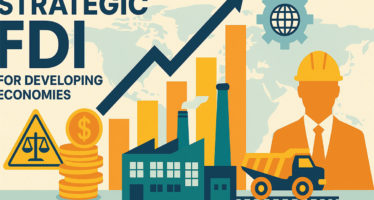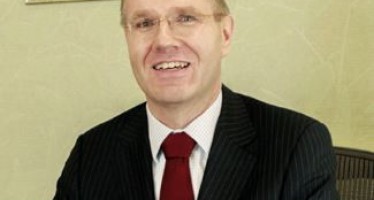Digitalisation and 4IR in MENA: Augmented Intelligence from Data and Self-Learning

Bashar Kilani (left) talking to CFI.co
Bashar Kilani oversees IBM business in the Gulf Countries and the Levant, working with clients and partners across industries.
Kilani has a passion for thought leadership around Digital Transformation, Artificial Intelligence, Blockchain and Cloud. CFI.co met with him in Dubai for a conversation and tour de force of thought leadership on new technology and applications in the region.
In these times in the Middle East several forces are coming together: the young population, the focus on women empowerment and also the strong drive for digital transformation that is really helping both the faster developing countries and the slower developing countries at the same time.
“When I got back from the World Economic Forum in Jordan earlier this year, the theme of the conference was the fourth industrial revolution in MENA.
“The first point is on the special demographic setup in the Middle East, it’s a very young population. These are educated people who are qualified to participate in the fourth industrial revolution.
“The second theme was the focus on women’s employment; this is an area where there’s huge untapped potential because in this part of the world about half of university graduates are women but only 15 percent are active in the workplace.
“The third point was digitalisation; and digitalisation is possibly the largest economic opportunity in the next few years. Maybe the most obvious one is retail and you can see that retail is moving into online and digital faster than other industries. If you look at the numbers that we have today between 2018 and 2022, in the UAE online retail will double and inside Arabia it’s going to be similar to that. That’s a big transformation and you’ve started to see big players like Amazon make inroads into smart retail, for example.
“You’ve seen some home-grown organisations like Noon offering digital transformation and online shopping. This is going to be driving a lot of GDP.
“In the UAE all the major banks will be launching digital-only banks. You are also starting to see airlines looking at the complete journey not only airport to airport but city to hotel or home to hotel, the whole journey around digital transformation and that’s a big play.
“In the UAE we’re very lucky to have a forward-looking government that is actually setting the pace. Maybe in other countries you’ll see the private sector leading but in this part of the world there’s a huge drive on digital transformation. You can see that in government, the first AI appointed minister is in the UAE and of course that creates a huge expectation, but it also creates a drive for the growth of artificial intelligence.
“There’s a lot of training going on, there’s a lot of enablement going on, there’s a lot of partnerships going on around making artificial intelligence and digitalisation one of the big industries that this part of the world will become known for within the next 10 years. There was a study recently which concluded that by 2030 15 percent of GDP will be driven by AI.
“It will create value because you will have new tools and capabilities that will make people more efficient and effective, you will see productivity going up, you will see a better understanding of how to handle data and analytics, how to create economic value out of data, how to discover patterns and so on. This is going to have a direct impact on GDP across the region and that’s the reason there’s a lot of focus on education, enablement and attracting start-ups and talent.
 “This region is unique because you’ve got the AI and blockchain focus but at the same time you’ve got challenges with digital and financial inclusion, and that’s the beauty of this part of the world. You travel out of Dubai, and within two hours you’re probably in a completely different world, while the opportunities and challenges you have in Dubai are around a society that has hyper-connectivity, huge penetration of mobile phones and high education standards. I would say a level of digitalisation that’s probably one of the best in the world.
“This region is unique because you’ve got the AI and blockchain focus but at the same time you’ve got challenges with digital and financial inclusion, and that’s the beauty of this part of the world. You travel out of Dubai, and within two hours you’re probably in a completely different world, while the opportunities and challenges you have in Dubai are around a society that has hyper-connectivity, huge penetration of mobile phones and high education standards. I would say a level of digitalisation that’s probably one of the best in the world.
“If you go to Pakistan or Egypt for example, you will find a very different situation, you will come across very different challenges, including low standards of education and healthcare and low levels of digital and financial inclusion. Digitalisation is a great tool to help elevate these.
“I’ll give you a statistic from Jordan; 50 percent of all university graduates are women, 25 percent of all university graduates in Jordan have an ICT focus. You will find similar numbers in other parts of the Middle East. IT and digitalisation are a huge enabler, especially for the young and for women. If you look at the start-up scene in the Middle East, you’ve got a lot of talent coming out of this part of the world.
“Careem is an example, the ride hailing app, which was just acquired by Uber for $3.1 billion dollars. There are three founders, one Pakistani, one Saudi and I think the third one was Swedish. Three of them came together and they revolutionised transportation. They created jobs, they empowered people, they helped in solving congestion issues.
“That’s all coming together with the fourth industrial revolution and I think you will see the impact in terms of GDP growth, improvements in healthcare and education standards will have a more dramatic impact on the economy and well-being than you will probably see in other parts of the world. It’s just happening all together at this point.
“We’re doing things in the region that are probably on a par with, if not better with than elsewhere, especially because the government is so forward-looking and you can actually engage in things quicker and easier than you would be able to do in a traditional European or American environment.
“Healthcare and education are a big emphasis for us. I think no areas have been changed by data and analytics and have a potential for AI like healthcare and education.
“We’ve got digital studios in the UAE that are state of the art, we’ve got a local blockchain node that is also state of the art and if you look at what we’re doing with some of these initiatives, it’s really innovative. You can have your blockchain network locally in the UAE, so you don’t have to send your data outside the UAE, this is very convenient for many government or banking organisations. We’ve got one in Dubai and one in Abu Dhabi, they run on very solid technology as it comes from the mainframe business that we have.
“For certain industries or clients there’s a requirement for data not to leave the UAE. In some cases, there are regulations covering this. For these reasons we’ve chosen to have two nodes in the UAE, it’s called the IBM Blockchain Platform.
“You can start seeing a lot of people using this in supply chains, tracing medicines and of course in banking. There’s a famous saying; the blockchain will do for digital transactions and for trading digital assets what the internet did for information.
“All our exchanges in the future will be done with digital assets that we can freely use in blockchain transfer. There’s the concept which is very active now called digital twins, so when you digitise a process or an operation you create a digital twin. There are many examples of creating digital twins for processes in banking and for government. IBM has worked with one of the ports in Europe, I think it’s Rotterdam, to create a digital twin for that port so you can simulate in a digital virtual world; the tide, the docking, loading or unloading and undocking of ships.
“All the mundane stuff, collecting data, analysing data and discovering patterns will come from AI driven systems. The same applies for management and engineering, so today in IBM we have AI tools to help managers with some HR related tasks. For example, if you have a budget and you’re looking at distributing certain pay increases, you get recommendations based on people’s performance, experience and skills and Watson gives you these kinds of recommendations.
“The APIs or the technology interfaces make up the artificial intelligence engines within IBM and these engines are being developed in our research labs, a lot of it also is done in partnership with our clients and partners because a lot of artificial intelligence depends on the data that you have, how you train the system on the data, what kind of efficiency and effectiveness are you getting out of it and so on.
“With a data lake, these systems become self-learning, they do machine learning, so they understand these data patterns and they start to become more accurate in their predictions and they start to become more efficient and effective in analysing the data. It removes a lot of the un-needed, unnecessary data, it focuses on data that is important for them and then of course you can add different types of data.
“There is what we call dark data, there is deep data. Dark data is the data that is not available searching the internet, it is data kept within organisations and enterprises. For example, if you are in the medical space, you can look for people’s vital values like blood pressure and so forth, this is also deep data because it is related to time. You must go deeper in time in order to access that data. Public data is the 20 percent that’s accessible and the 80 percent is dark data. All the data that we have today is less than one percent of what can be measured once we digitalise our world, once we start trading digital twins.
“It’s a common application especially in sales. People in sales use these kinds of tools to understand their clients, they collect the data from different sources, they look at, for example, financial reports that have been published to understand trends. They also access platforms like LinkedIn to understand the people, the organisation and the culture.
“They probably also look at the social data from platforms like Twitter and so forth. Again, we’re talking here about augmenting intelligence. Today an AI engine can do it at a fraction of the time to far greater accuracy.
“We call it IBM Cloud Private for Data. We are moving into a world where everybody is a data scientist. I think a key skill that everybody needs is to become a data scientist in his field. You need to know how to use these technologies and you also need to know what you’re looking for. If I’m a doctor and I’m looking for certain patterns around some certain cancer cells and so forth, then I need to use my medical knowledge with data science to do this.
“And we can move on from one industry to another because everything is digitised, and we work with all these digital twins that use the IoT to give us a lot of data and we will have to make judgements on what to do with it. Therefore, we need AI. Fifteen percent of GDP in 10 years from now will come from AI, because data will be the new oil and AI will be the electricity that powers it and gets value out of it.
“The UAE is very well positioned because it has a very wide set of cultures and backgrounds living in the region. We’ve got more than 200 nationalities, they speak many languages, they have a lot of cultures so the type of data that you collect in the UAE is very diverse, it’s very spread, it’s inclusive and if you use this data to train artificial intelligence engines, it will become better, more effective than if you use data that comes from just one culture. The data you get in the UAE is probably of higher quality than the data you would get in other parts of the world that have a single culture and background.”
You may have an interest in also reading…
Strategic FDI: How Developing Economies Can Attract Investment That Transforms
Foreign Direct Investment (FDI) remains a cornerstone of development strategies across emerging markets—but quality, not just quantity, determines its impact.
CFI.co Meets Dr Bernd van Linder
Dr Bernd van Linder has been Managing Director of Saudi Hollandi Bank (SHB) since May 2009. From 2006 to 2009,
Plus ça Change: Mired in Multiple Crises, Lebanon Votes for Continuity
In a scathing indictment of the country’s political elite, Lebanon tumbled some 25 places on the annual United Nations World















































































